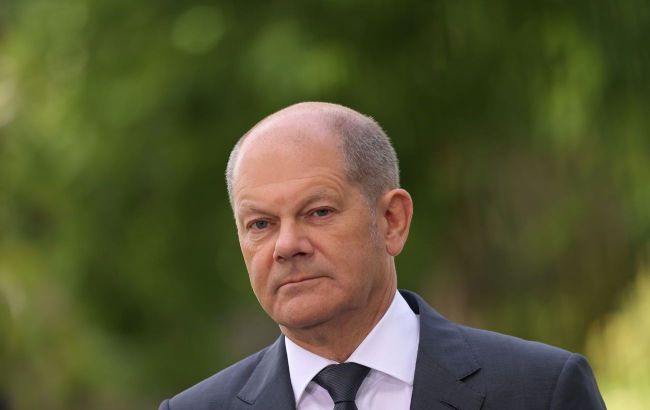Scholz's 'sore spot': Impact of Bundeswehr leak on Ukraine's Taurus missiles bid
 Olaf Scholz, Chancellor of Germany (Vitalii Nosach, RBC-Ukraine)
Olaf Scholz, Chancellor of Germany (Vitalii Nosach, RBC-Ukraine)
The scandal involving eavesdropping and leaking conversations of German officers about the deployment of Taurus missiles in Ukraine has rocked the Bundeswehr. Western media report on the pressure Chancellor Olaf Scholz is facing, as well as raise questions about how Russia could have obtained the recordings.
More on the scandal, dubbed Taurus-Leaks, and whether it will impact Scholz's decision to transfer Taurus to Ukraine in the material by RBC-Ukraine.
The preparation of the material involved information from The Wall Street Journal, German outlets dpa, zdf, Bild, FAZ, statements by German Chancellor Olaf Scholz, Defense Minister Boris Pistorius, other politicians, and comments from the head of the Center for Military Legal Studies, Oleksandr Musiienko.
Content:
- Taurus missile, preparation, and the Crimean Bridge. What German officers were discussing
- Was the leak just a matter of time? How are Scholz and German politicians reacting?
- Eavesdropping via WebEx. How did the Russians manage to obtain the recording?
- Scandal involving wiretapping: Сonsequences for Scholz and Ukraine
Taurus missile, preparation, and the Crimean Bridge. What German officers were discussing
On Friday, March 1, Russian propagandist Margarita Simonyan published interceptions provided by "people in uniforms." This is a 38-minute recording taken from a virtual teleconference. It features the Chief of the German Air Force (Luftwaffe) Ingo Gerhartz, Air Force Command Chief of Operations and Exercises Frank Gräfe, as well as employees of the Space Operations Center with the surnames Fenske and Froschtedt discussing the supply and use of Taurus cruise missiles in Ukraine.
It should be noted that Ukraine has been requesting their transfer from Germany since May 2023, but Chancellor Olaf Scholz constantly refuses. Ukraine has high hopes for Taurus, which would enhance its combat capabilities for destroying Russian rear bases and is seen as a long-range means that could destroy the Crimean Bridge.
More details can be found in a separate article by RBC-Ukraine.
As reported by The Wall Street Journal, on February 19, Gerhartz held a secret conversation with top Luftwaffe officers via an online conference system. One of the participants, Frank Gräfe, joined the call from a hotel room in Singapore. The commander instructed to prepare a presentation for Defense Minister Boris Pistorius on how Berlin could deliver Taurus and how Ukraine could use them. Officers extensively analyzed how to attack the Crimean Bridge, emphasizing that 10 to 20 missiles would be needed to bypass Russian air defenses and inflict critical damage.
"There is no real reason to say we can’t do this; it only depends on the political red lines," says Gerhartz.
.jpg) Photo: Commander of the German Air Force Ingo Gerhartz discussed the delivery of Taurus to Ukraine with officers (bundeswehr.de)
Photo: Commander of the German Air Force Ingo Gerhartz discussed the delivery of Taurus to Ukraine with officers (bundeswehr.de)
Germany has about 600 Taurus missiles in its arsenal, with around 500 presumably in working order. Gerhartz notes that Germany could allow the delivery of 100 missiles in two batches of 50 units each. In his opinion, a larger quantity makes no sense, as this weapon is incapable of turning the tide of war. Destroying the Crimean Bridge would be an important strategic and political step, but Ukraine is unlikely to develop it into a large-scale ground offensive, according to the general.
"This will not change the course of the war, we must be clear about that," says Gerhartz.
According to the interception, it will take 6 hours to strike a reconnaissance target in Ukraine if the personnel are prepared and have access to all necessary information. Officers say that the German Air Force has modeled the area around the battlefield for Taurus to help the Defense Forces bypass air defenses near key targets, including the Crimean Bridge. However, the dissemination of topographic data would supposedly violate the German government's ban on involvement in the conflict, one officer said.
Training will take from two weeks to 4 months depending on the level of precision and complexity of the tasks. Gerhartz also notes that Scholz insists that any delivered missile be used without the involvement of the Bundeswehr. The recording also mentions that Taurus can be relatively easily integrated under Ukrainian Su-24 or F-16, which are expected to be delivered this year.
In addition, Gerhartz made a statement about the supposed presence of Western military personnel "with American accents run around in civilian clothes" in Ukraine. Officers also discuss that Britain supposedly has several individuals on-site due to the use of supplied Storm Shadow missiles. Officially, Ukraine and its partners deny the presence of foreign military personnel.
Was the leak just a matter of time? How are Scholz and German politicians reacting?
The next day, the Federal Military Counterintelligence Service (BAMAD) began an investigation. The Ministry of Defense confirmed the authenticity of the recording published by the Russian side.
"According to our assessment, the conversation in the Air Force was intercepted. So far, we cannot say with certainty whether any changes were made to the audio or written version circulating on social media," said a spokeswoman for the German agency.
This admission increases the pressure on Chancellor Scholz. He has repeatedly stated that the delivery of missiles would require the presence of German troops. However, the chairman of the European committee in the Bundestag, Anton Hofreiter (Greens party), noted that on this issue, "the chancellor is clearly lying." For example, South Korea has 260 Taurus missiles, but there are no Bundeswehr soldiers there. Judging from the recording, Gerhartz also does not fully understand Scholz's arguments.
"As no one really knows why the chancellor is blocking something, the most whimsical rumors arise," he said, adding that he had to refute false statements about Taurus to journalists.
Thus, Scholz is caught under the crossfire. The opposition threatens to create an investigation commission, and the CDU/CSU bloc questions the chancellor's authority. The leader of the CDU/CSU regional group, Alexander Dobrindt, called the situation "doubly strange" and joined the call of Scholz's coalition partners - the Greens and the Free Democrats (FDP) - for clarification in the Bundestag.
The chancellor seems to understand the urgency of the problem. According to him, the interception incident is a "very serious issue" that requires quick explanations.
"That is why we are now clarifying everything thoroughly, intensively, and quickly. This is very necessary," he said on Saturday during a visit to the Vatican.

Photo: Olaf Scholz is under pressure due to the leak of German officers' conversation (Getty Images)
Defense Minister Boris Pistorius called the eavesdropping part of Russia's information warfare and a hybrid attack on Germany.
"This is part of the information war being waged by Vladimir Putin. It's about division. It's about undermining our unity. And, accordingly, we must react to this particularly carefully, but no less decisively," he said, adding that we must not "succumb to Putin."
Vice-chair of the Green parliamentary group Agnieszka Brugger accused Putin of destabilizing the situation and suggested that information diversions would occur again soon. Her party colleague and chairman of the parliamentary control committee of the Bundestag, Konstantin von Notz, talks about a precedent extremely dangerous for Germany and its allies.
"This shows that Russia is now using all means to politically divide us, distract us from other intelligence operations, and hinder further support for Ukraine. Counterintelligence must react to this in close coordination with European and international partners," he noted.
Chairwoman of the Defense Committee Marie Agnes Strack-Zimmermann calls for strengthening measures against espionage. According to her, the leak of officers' conversation should "put an end to our naivety." She considers espionage as part of Russia's hybrid warfare toolkit and is not surprised that conversations are being intercepted.
"It was only a matter of time before this became public knowledge," she said.
Oleksandr Musiienko, head of the Center for Military Legal Studies, believes that it was not by chance that almost two weeks passed between the recording and the leak. According to him, the Russians were waiting for an escalation of the discussion about Taurus and new statements about Germany's inadmissibility to be involved in the Russian-Ukrainian war.
"So they waited. They leaked the conversation when the chancellor once again demonstrated a certain vulnerability. And it must be admitted they leaked it successfully and conducted a decent operation. Exactly to discredit Scholz, as they understood that against the backdrop of his statements, it would generate rumors that Germany supposedly planned some military actions. The special operation confirmed, as they think in Russia, that the chancellor is right since this is what the German military says," he explains in a comment to RBC-Ukraine.
Eavesdropping via WebEx. How did the Russians manage to obtain the recording?
The leak became a propaganda victory for the Kremlin and confirmation that Berlin is vulnerable to Russian espionage. It is worth recalling that in December, an officer of the BND foreign intelligence service was arrested on charges of passing data on HIMARS and IRIS-T systems deployed in Ukraine to Russia for 450,000 euros.
As for the eavesdropping, the investigation will have to determine how the recording ended up in the hands of the Russians. There is suspicion that the conversations took place over an unprotected line. According to dpa, the officers used the communication program WebEx, and the session notification was sent to smartphones via the office landline of the Bundeswehr.
"There are signs that an insufficiently secure communication tool was used given the content that was discussed. This, among other things, is the subject of further investigation," said the Ministry of Defense spokeswoman in a comment to Bild.
 Photo: Defense Minister Boris Pistorius confirmed that Bundeswehr officers use WebEx when communication involves a low level of confidentiality (Getty Images)
Photo: Defense Minister Boris Pistorius confirmed that Bundeswehr officers use WebEx when communication involves a low level of confidentiality (Getty Images)
As reported by the online magazine Heise, WebEx does not have end-to-end encryption during phone calls via a browser. And the fact that the interlocutors did not establish an encrypted connection is a "fundamental security problem." Official information regarding WebEx has not been confirmed yet. However, Pistorius stated that the system is used for communication below a certain level of confidentiality.
German media, citing officials familiar with the leak investigation, report that WebEx is widely used by military and other secret agencies. And the recent incident has become a "warning bell."
Musiienko emphasizes that Western countries have deployed a significant Russian espionage network.
"Russians are monitoring and trying to eavesdrop on senior military officials in Europe and other countries. They need to understand plans, anticipate what to expect, what they may encounter, and so on. Certainly, they will continue intelligence activities. Does this mean there will be new attempts? Of course. But I can say that in the West, this is also understood. If anything, it's always a two-way street. I hope the West will not silently observe this," adds the expert.
Scandal involving wiretapping: Сonsequences for Scholz and Ukraine
In the matter of long-range missiles Taurus, the German chancellor has been under pressure for several months. Both coalition partners and Western allies insist on transferring the missiles to Ukraine. At one point, Britain even offered to take the lead and pass on Taurus from itself to protect Scholz from accusations of inconsistency.
Now Russia is also putting pressure on him. After the leak with detailed discussions, Russian officials attacked Germany and threatened retaliation if it became "involved in military action." And this, at least, is worrisome, as Olaf Scholz feared and continues to fear Russia, explains Oleksandr Musiienko.
"Russia has touched a sore spot for the chancellor, who sees the transfer of missiles as Germany's direct involvement in the war. We see that Moscow deliberately conducted an operation to prevent any desire in Berlin to do so. Therefore, it is very doubtful that a positive decision for us will be made. Most likely, it will be postponed for a significant period," he tells RBC-Ukraine.
Given that Scholz constantly brings up new arguments, leaking conversations of Luftwaffe officers will not only delay the deliveries but also make them impossible under this chancellor. In fact, a refusal to do so will trigger internal processes that could lead to his resignation.
"He remained steadfast, despite the position of the Bundestag and coalition partners, he still did not support it. And now he has the tools to postpone the decision as long as the investigation continues. As far as I can tell, he will use this argument to not transfer Taurus," Musiienko emphasizes.
Today's statement by Scholz also speaks to this. In addition to the long-range missiles with a range of over 500 km, which "can reach targets in Moscow," and the alleged need to deploy Bundeswehr troops in Ukraine, the issue of control has also been added to the arguments against it.
"It is impossible for a system with long-range impact to be supplied without thinking about how control over this weaponry should be. And if you want to have control, which is only possible with the participation of German servicemen, then this is completely ruled out. I made this statement very clear. I am the chancellor, so it will be so," he says.

